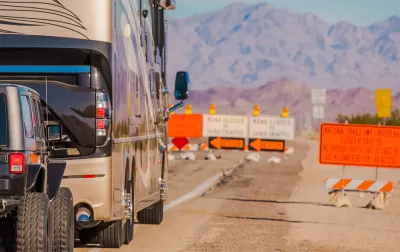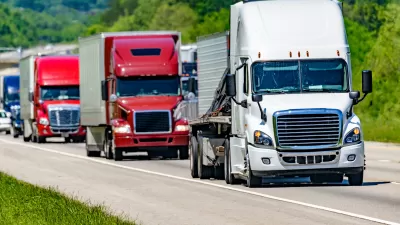Established in 2005 to reduce toxic diesel emissions, the Diesel Emissions Reductions Act expired in 2016. A bipartisan effort appears to be in place to see it reauthorized this year.

"Sen. Tom Carper led his colleagues in introducing bipartisan legislation [S.747] that would reauthorize the Diesel Emissions Reduction Act through fiscal 2024," reports Eugene Mulero for Transport Topics.
The program, administered by the U.S. Environmental Protection Agency, relies on federal grants and rebates. The funding is used to help finance the voluntary replacement or installation of retrofits on existing heavy-duty diesel vehicles and engines.
The program is so successful, every dollar invested in DERA generates a 13-fold return in health and economic benefits,” said Carper (D-Del.), ranking member on the Environment and Public Works Committee.
"U.S. Senator John Barrasso (R-Wyo.), chairman of the Senate Committee on Environment and Public Works (EPW), highlighted the importance of the Diesel Emissions Reduction Act (DERA) to communities in Wyoming," according to his March 13 press release. [Bill number not available as of March 18].
Barrasso noted several school districts in Wyoming have used funds from the DERA program to replace aging school buses, both to improve efficiency and reduce emissions.
“This funding has been key to incentivizing and expanding port environmental programs to improve air quality impacted by port operations,” American Association of Port Authorities stated during an EPW hearing March 13. Other DERA proponents include American Trucking Associations for reasons acknowledged by Sen. James Inhofe (R-Okla.) a day earlier:
"The program has been used to voluntarily upgrade more than 73,000 diesel-powered vehicles, all while creating lucrative manufacturing jobs. I am proud to have supported the program since it was first created more than a decade ago and I am proud to once again introduce bipartisan legislation to reauthorize such an effective program with Sens. Carper, Barrasso and Whitehouse.”
"On March 14, House lawmakers followed their EPW Senate counterparts to unveil a version of the DERA reauthorization," adds Mulero. "The House bill also would enable upgrades to diesel engines."
Bipartisan support does that mean the bill will succeed. Mulero noted that notwithstanding the chairman's apparent support for the program, at the March 13 hearing he "would not specify when the panel would take up the bill during the 116th Congress."
However, a DERA reauthorization bill did pass the Senate last year, but the House bill was never heard. With Democrats in control of that branch of Congress, perhaps it will fare better this year, although the bill is yet to be numbered as of March 18 and doesn't show on the House Committee on Energy and Commerce website.
Successful bipartisan legislation passed by the Senate Committee on Environment and Public Works:
The committee's webpage notes these three bills that became laws:
- President Trump Signs Bipartisan Wildlife Conservation Legislation into Law, March 12, 2019. The WILD Act was included in S. 47, the Natural Resources Management Act, posted here.
- President Trump Signs Bipartisan Nuclear Energy Legislation into Law, January 14, 2019 [S. 512]
- President Trump Signs America’s Water Infrastructure Act into Law, October 23, 2018 [S. 3021]
FULL STORY: Senators Introduce Diesel Emissions Bill

Planetizen Federal Action Tracker
A weekly monitor of how Trump’s orders and actions are impacting planners and planning in America.

Map: Where Senate Republicans Want to Sell Your Public Lands
For public land advocates, the Senate Republicans’ proposal to sell millions of acres of public land in the West is “the biggest fight of their careers.”

Restaurant Patios Were a Pandemic Win — Why Were They so Hard to Keep?
Social distancing requirements and changes in travel patterns prompted cities to pilot new uses for street and sidewalk space. Then it got complicated.

California Homeless Arrests, Citations Spike After Ruling
An investigation reveals that anti-homeless actions increased up to 500% after Grants Pass v. Johnson — even in cities claiming no policy change.

Albuquerque Route 66 Motels Become Affordable Housing
A $4 million city fund is incentivizing developers to breathe new life into derelict midcentury motels.

DC Area County Eliminates Bus Fares
Montgomery County joins a growing trend of making transit free.
Urban Design for Planners 1: Software Tools
This six-course series explores essential urban design concepts using open source software and equips planners with the tools they need to participate fully in the urban design process.
Planning for Universal Design
Learn the tools for implementing Universal Design in planning regulations.
Heyer Gruel & Associates PA
JM Goldson LLC
Custer County Colorado
City of Camden Redevelopment Agency
City of Astoria
Transportation Research & Education Center (TREC) at Portland State University
Camden Redevelopment Agency
City of Claremont
Municipality of Princeton (NJ)





























